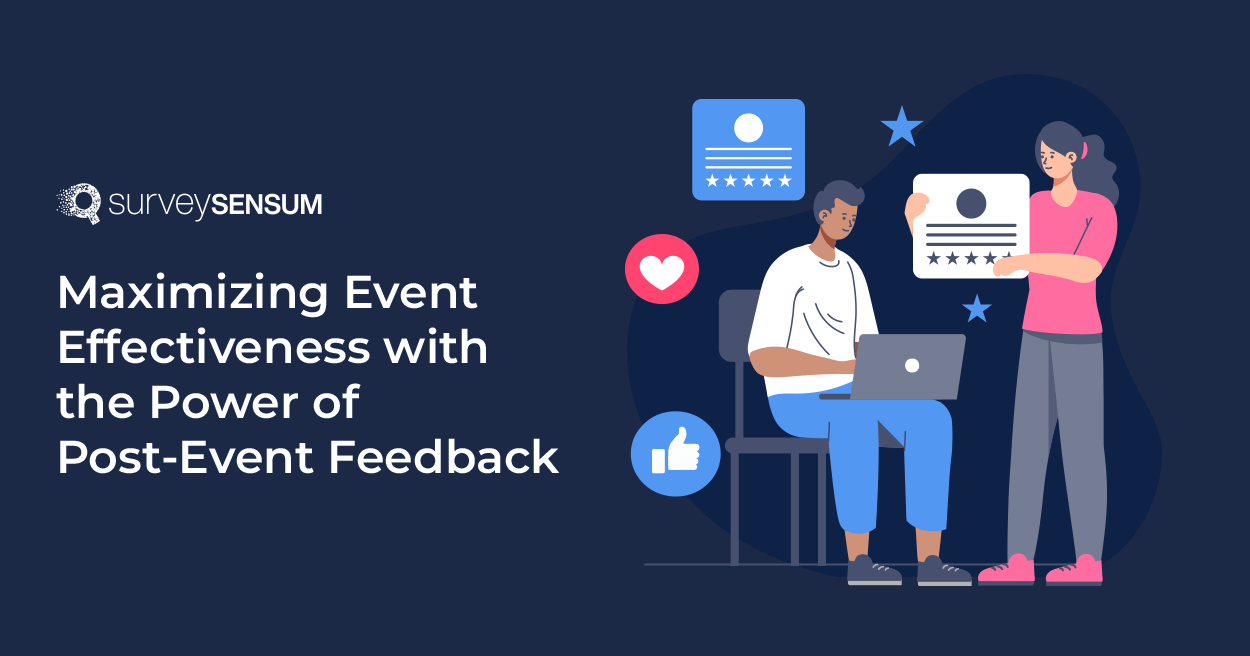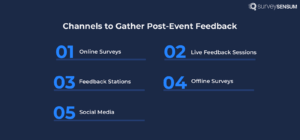Innovative Team Collaboration: 3 Tools for Seamless Project Management
Read More

Congratulations! You successfully organized your event!
However, do you know for sure whether it was a success or not?
Post-event feedback is like a report card for your event and an inside glimpse into the minds of your audience post-event.
It is critical to understand the strengths and weaknesses of the event you organized, and also what the audience liked and disliked. Positive feedback will not only boost your confidence but can even be leveraged to increase the overall effectiveness of your event.
Moreover, this is beneficial for future events. You can work on areas that need improvement, and make sure that your attendees have a seamless experience every time they return back.
As a brownie point, post-event surveys can also be used to send notifications about future events to the attendees. Make sure to put in a stellar event description and ensure that the feedback will be valuable for future events.

There are many methods for collecting post-event feedback, including online surveys and questionnaires, live feedback sessions, and feedback stations. Each method has its own advantages and potential drawbacks.
They are a popular way to collect feedback because they are easy to distribute and analyze. You can send the survey to attendees via email, social media, e-business cards, or text message. Online surveys can be customized to collect specific information about the event, such as the overall satisfaction, the quality of the speakers, or the food. However, online surveys can be time-consuming to create and distribute, and they may not get a high response rate.
You can hold a Q&A session at the end of the event or have attendees fill out feedback forms at designated stations. Live feedback sessions can be more engaging than online surveys, but they can also be more disruptive to the event.
They are a hybrid of online surveys and live feedback sessions. Attendees can fill out feedback forms at a designated station, , and attendees can also share their feedback on an Instagram wall event, but they can also submit their feedback online. Feedback stations can be a good way to get feedback from a large number of attendees, but they can also be time-consuming to set up and manage.
They are a way to collect feedback from attendees in person. This can be done by holding a focus group or by conducting interviews. Offline surveys can be more personal and in-depth than online surveys, but they can also be more time-consuming and expensive.
You can ask attendees to share their thoughts and experiences on social media, or you can create a dedicated hashtag for the event. Social media feedback can be quick and easy to collect, but it can also be less reliable than other methods.
The best method for collecting post-event feedback will vary depending on the specific event and the goals of the event planners.
Here are some factors to consider when choosing a method:
No matter which method is chosen, it is important to send the feedback form or post right after the event is over, while the excitement is still fresh in the minds of the attendees. This will help to ensure a high response rate. Otherwise, you can use an AI paragraph generator to quickly craft thoughtful and timely responses to feedback that demonstrate your opinion. Additionally, consider providing a translated version of the feedback form or post to reach a wider audience. Feel free to use an easy online translator to make your content more accessible to diverse participants.
For instance, if your survey covered various aspects of your event such as accommodation, content quality, networking opportunities, customer service, even RV rentals, and more, calculate the average ratings for each category. This initial analysis will pinpoint areas in need of improvement.
Consider sending tailored post-event surveys to different groups, including attendees, speakers, and guests. Each survey can focus on aspects relevant to their respective experiences.
For instance, if your survey covered various aspects of your event such as accommodation, content quality, networking opportunities, customer service, and more, calculate the average ratings for each category. This initial analysis will pinpoint areas in need of improvement.
Consider sending custom post-event surveys to different groups, including attendees, speakers, and guests. Each survey should concentrate on aspects relevant to their respective experiences.
Gather Customer Review with SurveySensum – Sign Up for Free
Post-event surveys are invaluable for collecting substantial data from your attendees. By analyzing this data, you can uncover trends and patterns in your audience’s preferences. This may include discovering the most effective marketing channels, identifying standout aspects of your event, and understanding their expectations for future events.
After compiling a list of pros and cons from the feedback, prioritize the areas that require the most attention. Concentrate on improving weak areas that have the potential to attract a larger audience and generate more revenue once enhanced.
Once you have prioritized the feedback, you need to develop a plan for how to address it. This may involve making changes to the event format, the speakers, the content, or the logistics.
Once you have a plan, you need to implement the changes. This may involve making changes to the event ticketing website, sending out emails to attendees, or making changes to the event itself.
It is important to track the results of the changes you have made. This will help you to determine whether the changes were effective and whether you need to make further changes.
By following these steps, you can effectively turn collected feedback into actionable insights that drive improvements in your future events. The data analysis process is crucial in identifying trends and patterns that inform your event strategies and enhance attendee experiences.
With an in-depth data analysis drawn from post-event surveys, you can now focus on enhancing your attendee’s experience. And working on the areas where your attendees felt the need for improvement is the way to go! Because, after all, customer experience is what will primarily drive the success of your event.
To enhance the attendee experience at events, organizers can gather feedback on various aspects, including the introduction of valet trash services which ensures a clean and clutter-free environment. By implementing such services, attendees can conveniently dispose of their waste, contributing to a more pleasant and seamless event experience.
Suppose your attendees felt that the list of speakers could have been more diverse, then, in the feedback form, you can ask them the industry areas they would like you to bring speakers from.
If there were issues with logistics and the event organization, let’s say the travel company you booked to move attendees to and from the venue did not provide good bus facilities, make sure to sort out the issue or hire a new service provider the next time.
In case the attendees found it difficult to network during the event, find out the root cause for that. Was it due to a shortage of time or the overall structure of the event that made it difficult for people with the same interests to connect? Spot out the reason and organize your event keeping that in mind the next time.
Post-event surveys can also help you realize loopholes even in the process of buying a ticket. Did the software you used have a good user interface? Did the attendees find it difficult to navigate the software in order to buy tickets for themselves? You can ask these questions in your questionnaire. You can also ask if the payment gateway you used was too slow or continuously crashing when multiple attendees were trying to make the payment. One solution to this is using PayPal. You can sell tickets with PayPal seamlessly as it is one of the most popular payment gateway with amazing integration features and the ability to handle huge Hosting server traffic. To further enhance the attendee experience, event organizers can utilize customized event invitation templates. These templates not only create a professional and engaging first impression but also set the tone for the event. Thoughtfully designed invitations can increase anticipation and interest, thereby potentially improving attendance and engagement rates. It’s a small yet impactful way to ensure attendees feel valued right from the start
When attendees take out the time to give you feedback, it means that they care about the events you organize, and plan to attend them in the future with the expectations of improvement based on the feedback.
The next time your attendees return to your event, and they see that you have worked on the problems mentioned by them, you will be able to build a sense of trust and loyalty with them. Continuous improvement is crucial for sustaining attendee engagement, as it gives the attendees the assurance that their voices are heard.
Moreover, continuous improvement is a great strategy in general as well. The better the management of your event, the more new attendees might join your community.
Now, now, we know you are eager to start sending feedback forms. You might also have a few questions prepared in your mind right now. However, it is important to keep certain points in mind while drafting feedback questions.
1. There are various types of questions, multiple choice, Yes/No, rating questions as well as questions whose answers need to be typed in.
While it is easy for an attendee to answer the first three types of questions, the last one can become tedious. However, no doubt, sometimes typed-in answers are required. For example, ask the attendees if there is anything else they wish to let you know that was not covered in the survey. Hence, make sure to keep such questions minimum.
2. Don’t keep such questions as compulsory questions. The last thing you want is for the attendees to fill out all the other answers but not be able to submit the form because they didn’t have the time to type answers for the compulsory questions.
3. Make sure to keep the entire feedback concise as well. Ask questions that will actually add value to the attendee experience and to your event organization. Respect your attendee’s time and do not beat around the bush.
4. Ensure to collect feedback as soon as possible after the event while the memory is fresh in the attendees’s minds. They will get busy in their daily lives afterward, and if you send surveys after a long time, they are sure to miss those messages or simply won’t bother to fill them then.
Post-event feedback is now one of the most important components of event planning and management. With proper feedback, you will be able to grow as a planner and organizer. And that’s human psychology. We always love our work, and hence often overlook the areas that need improvement. Feedback from other people makes us realize our shortcomings.
AI-driven feedback platforms such as SurveySensum make surveys easier to conduct. SurveySensum feedback platform along with AllEvents event ticketing software, enables you to massively increase online ticket sales and enhance the overall event experience for your customers.
The software comes with a data analytics tool that can sort out the individual preferences of your attendees, as well as their collective behavior based on when they buy tickets, through which website they are redirected to the ticketing platform, their answers in surveys, etc.
Based on the feedback of your attendees, you can not only improve but also personalize and customize various aspects of your event that are best suited for your specific audience.
Author Bio:
Amit Panchal is the Co-founder of AllEvents, a leading event ticketing, event marketing, and event discovery platform that helps event seekers discover events happening around them. It makes it easier for organizers to sell event tickets, market their events & increase their event reach, and promote it in weekly and monthly newsletters & across all AllEvents social media platforms.
